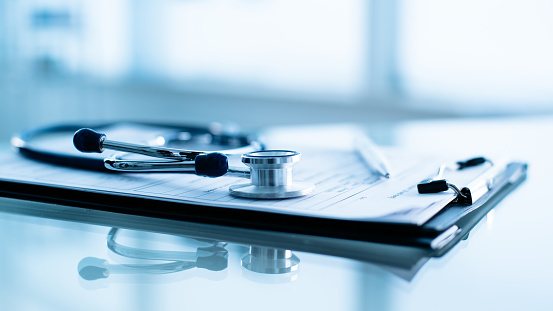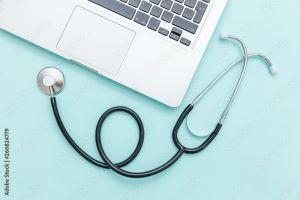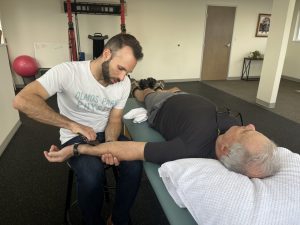
Can media help medicine? This article researches a significant topic, that is how media can affect the medical world. Critically acclaimed scholars have completed extensive research on this topic, and there are many supportive examples to shedding light on my claim. Society relies so heavily on medicine, but is some of this weight now being taken off these doctors shoulders and hoisted onto the internet. I am wanting to dig deeper and find out the true assistance of social media in relation with Health Care Professionals (HCPs) medical treatment. The history involving media and healthcare runs deep. After World War II, public health started to become more of a priority and along with this came the healthcare system. Soon enough a problem arises that involves keeping important records afloat and attainable. In 1972 the first digital medical record system was created. In a blink of an eye we are now in the 20th century that revolves around the use of media. Allowing society to possess medical information at home, and gives doctors the ability to communicate information with patients, and colleagues.

“Media provides HCPs with tools to share information, to debate health care policy and practice issues, to promote health behaviors, to engage with the public, and to educate and interact with patients, caregivers, students, and colleagues(Ventola 2014).” Throughout this article many points were made regarding how this is a helpful tool. Health care professionals turn to this outlet to enhance there practical knowledge and to put useful information on certain platforms for their colleagues and patients. Important networks used by healthcare professionals are SERMO which is a Latin meaning for communication, discussion and conversation, Doximity, and Daily Rounds. These networks are specifically used for community engagement and learning for professionals in the medical world.
One could say that the weight is lifted off some of the medical world in regards to communication, and the need for maximum growth when it comes to knowledge. Moreover this is a great use of media in the medical world and can be seen as utilizing every outlet. Being we are in the midst of a pandemic, media has shown to have some great attributes. Pandemics strain and pressure communication in support of medical practice, being that through media we can now access important information easier and faster. “There is a substantial literature on the ways in which media entities, including those from professional (TV, newspapers, and other established non user-generated platforms) and social (primarily user generated) sources, can both educate and communicate important information but also sow fear and misinformation(Carlo 2021).”However a pandemics protocol is always changing, whether that be to maximize or lessen set mandate.” That being said this could lead to out of date information still being available to society in the media.

Furthermore health care professionals main objective has always been to make society a healthier unit. Now that technology and media are introduced to this world, can some lines be blurred as for what is the most efficient and sufficient way to handle certain scenarios, and to gather information? The problem that arises is the question as to whether or not media gives society the proper medical attention needed, or even accurate information. For example, we are in a time now where almost everyone turns to the internet to google their symptoms and causes for what they are enduring at the moment. If you happen to do a google search using keywords to describe your symptom and the results from the internet sources may tell you that you have cancer, when in reality it could just be a common cold. This is a common misconception that media can give society. False treatment is the risk we, as a whole take when intertwining the media with medicine. Although it can be a brilliant outlet to use, there are always drawbacks. Statistics have shown how popular this can be. “A large survey found that more than one-third of Americans self-diagnose when they encounter a health problem, and another study indicated that about 70% of American adults consult the internet for a variety of medical information(Hochberg 2020).” It is very prevalent that this is a commonly used avenue when it comes to the population within the medical world.

Because there is such a high demand for the media when it comes to medical advice, we can now acknowledge the fact that it is reliable to a certain extent. I have been interning with a doctor over the past couple months and decided to bring this controversial topic to the table. Dr. William Gonzaba, a Certified Physical Therapist states that, “Overall I think that COVID brought to light a lot of negatives about media’s effects on medical decisions. It showed how politics can affect media’s decisions. Outside of that, there is a lot of great information and tools to be used on the internet, as well as a common mistake of misinformation.” Gonzaba noted that media in the medical world can often be useful but more often than not should be taken with a grain of salt, if it is not coming from a licensed professional or an acclaimed resource. We can now determine that media should hold a secondary position to doctors when it comes to medicine.
Overall this problem cannot merely be solved because as a society we allowed internet sources to state whatever they wish, when it comes to health related information. Sources can offer helpful tips and advice, however media will always be present, and advancing and the sources need to keep the content current and available. Although there is some advantages to the use of media, I am afraid the negatives out way the good in most medical scenarios. The question we have to ask ourselves is are we okay with putting the fate of our health into a hands of content creators and search engines serving up the content.
References
Carlo, Andrew D, Brian S Barnett, Utibe R Essien, and Sandro Galea. “Redefining Medicine’s Relationship With the Media in the Era of COVID-19.” American Journal of Preventive Medicine 60, no. 1 (January 2021): 142–45. doi:10.1016/j.amepre.2020.08.016
Hochberg, Irit, et al. “Assessment of the Frequency of Online Searches for Symptoms before Diagnosis: Analysis of Archival Data.” Journal of Medical Internet Research, JMIR Publications, 6 Mar. 2020, https://www.ncbi.nlm.nih.gov/pmc/articles/PMC7084283/.
Ventola, C Lee. “Social Media and Health Care Professionals: Benefits, Risks, and Best Practices.” P & T : a Peer-Reviewed Journal for Formulary Management, MediMedia USA, Inc., July 2014, https://www.ncbi.nlm.nih.gov/pmc/articles/PMC4103576/.